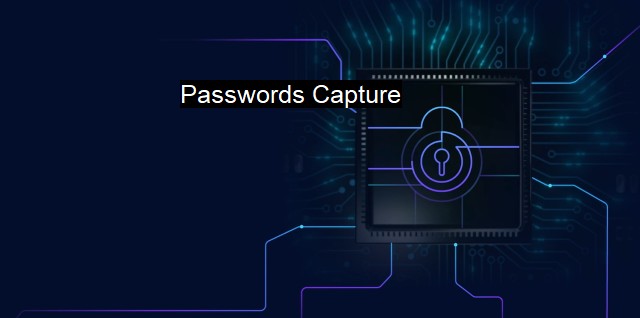What is Passwords Capture?
The Risks of Password Capture: Protecting Your Digital Life Against Cyber Threats
Passwords capture is a tactic used by adversaries to acquire the password credentials of individuals. This is a form of attack that hackers employ to breach the system and gain unauthorized access. Passwords capture, also known as password interception or password hacking, is a significant threat to individuals and organizations alike operating in the digital sphere, highlighting the importance of robust passwords and topnotch cybersecurity mechanisms.Typically, when users sign into online accounts, they input their credentials - usernames and passwords - into an entry form. These credentials are then transmitted over a network to a server that verifies them. during this transmittance, they have the potential to be intercepted by malicious actors, leading to password capture. Intercepting and retrieving passwords from network traffic is often performed through a suite of techniques collectively called 'sniffing' or 'spoofing'.
One common way that adversaries capture passwords is through keystroke logging. Here, software known as a keylogger is covertly installed on a target's computer, often via malware. Once operational, it records every keystroke made, including entered usernames and passwords. The keylogger then transmits the collected data back to the hacker.
Phishing is another prevalent method used to facilitate password capture. In a phishing attack, the user is tricked into revealing their login credentials. This is often achieved by the attacker posing as a legitimate entity, like a bank or social network, and presenting the user with a seemingly credible 'login' page. When the user inputs their details, they're actually delivered straight into the hands of the attacker.
Users may also unwittingly offer their passwords to threats from trojans that masquerade as innocent software but stealthily run malicious processes in the background, including password capture. Trojans exploit the trust users put into software downloads from unreliable sources, email attachments, or suspicious web pages.
Password cracking is another significant concern. Hackers use tools and algorithms to guess passwords, relying on users’ propensity to create simple, easily decipherable passwords. These tools attempt thousands of combinations in seconds, eventually stumbling upon the correct one.
While dealing with password capture sounds daunting, understanding the risks and possible methods can significantly bolster defense strategies, particularly concerning antivirus solutions. These services provide critical, comprehensive protection against many threats, including password capture.
Antivirus software often comes equipped with real-time scanning and detection capabilities to identify threats such as keyloggers, trojans, malware, and other suspicious activities indicative of password capture. These security suites may also include firewalls that act as first-line defenses, prevent unsolicited incoming connections, and protect against potential password sniffing.
Antivirus software often incorporates enhanced security measures like anti-phishing tools to safeguard users falling for credentials-stealing scams. It discourages users from clicking on suspicious links embedded in emails or on websites, considerably mitigating risks.
Several antivirus solutions come with password managers integrated into their systems. These tools enhance security by enabling users to generate and store complex, unique passwords for each account, making them far less likely to be cracked or guessed.
To amp up protection against password capture, users should employ multifactor authentication (MFA) wherever possible alongside antivirus software. MFA adds an extra verification layer to confirm identities beyond simply providing a password.
Password capture is a grave security risk in the current digital landscape, aiding unauthorized access to sensitive information. Thus, robust password hygiene, coupled with application of effective cybersecurity best practices and comprehensive antivirus solutions, is paramount in building a solid defense against threats of password capture. Although not entirely foolproof, such an approach could potentially close many doors that hackers could otherwise exploit, safeguarding digital assets, resources, and privacy.

Passwords Capture FAQs
What is passwords capture?
Passwords capture refers to the act of intercepting and collecting passwords entered by users. This is typically done through malware or phishing attacks aimed at stealing login credentials.How can passwords capture be prevented?
There are several measures you can take to prevent passwords capture, including using strong passwords, enabling two-factor authentication, avoiding suspicious emails or links, and keeping your antivirus software up-to-date.What are the consequences of passwords capture?
The consequences of passwords capture can be severe, ranging from identity theft and financial loss to reputational damage and legal issues. Hackers who steal passwords can use them to access sensitive data, compromise user accounts, and launch further attacks.What should I do if I suspect my passwords have been captured?
If you suspect your passwords have been captured, it is important to take immediate action. This may include changing your passwords, notifying your bank or credit card company, and running a scan with your antivirus software. It is also wise to monitor your accounts and credit report for any signs of unauthorized activity.| | A | | | B | | | C | | | D | | | E | | | F | | | G | | | H | | | I | | | J | | | K | | | L | | | M | |
| | N | | | O | | | P | | | Q | | | R | | | S | | | T | | | U | | | V | | | W | | | X | | | Y | | | Z | |
| | 1 | | | 2 | | | 3 | | | 4 | | | 7 | | | 8 | | |||||||